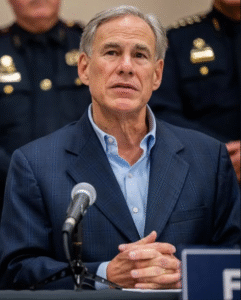🚨 “The Great Texas Warning: Greg Abbott’s Tariff on New Yorkers — Bluff, Battle Cry, or the Beginning of a New American Migration War?”
In a moment that captured the nation’s attention and set social media ablaze, Texas Governor Greg Abbott issued what he called a “100% tariff on anyone moving from New York City to Texas.” Though his remark was later clarified as a joke, it struck a nerve that resonated far beyond the Lone Star State. Was it merely bluster—a tongue-in-cheek jab at liberal city dwellers fleeing their own policies—or was it a symbolic warning about the cultural and economic rifts widening across the American map?? Abbott’s words, whether calculated or spontaneous, may have revealed more than they concealed—a reflection of how internal migration has become one of America’s newest political battlegrounds.
⚡ The Moment That Sparked Debate
The statement came amid speculation that thousands of frustrated New Yorkers, faced with high taxes, rising costs, and progressive city politics, might relocate to red states like Texas. Abbott’s “tariff” comment—claiming he would impose a 100% fee on anyone moving from New York—spread instantly across social platforms, sparking outrage, laughter, and curiosity.
Of course, no governor can legally tax or restrict citizens moving between states. The U.S. Constitution’s Commerce Clause and the right to free movement make such a tariff impossible. But the symbolism was unmistakable. Abbott wasn’t really talking about a fee—he was sending a message about cultural boundaries, identity, and belonging.
To many Texans, the governor’s quip echoed a broader sentiment: that waves of newcomers from high-tax, liberal states were changing the very character of the communities they moved to. To others, it sounded like a warning shot in a brewing ideological standoff between “blue state leavers” and “red state loyalists.”
🧭 Why Abbott Said It — And What It Signifies
Politically, Abbott’s statement works on several levels.
First, it plays to his base—Texans proud of their state’s independence, wary of outside influence, and skeptical of urban liberalism. Texas has long defined itself as a frontier of self-reliance and freedom, values many residents feel are under threat from what they perceive as coastal overreach. Abbott’s “tariff” remark, then, was a rhetorical fence—a way to draw a line around the Texas identity.
Second, it was a pointed critique of the policies driving people out of major cities. Rising crime, higher taxes, and expensive housing have made places like New York, San Francisco, and Los Angeles less appealing to middle-class professionals. Abbott’s warning—half joke, half prophecy—implied that the very same people voting for those policies were now seeking refuge from their consequences.
Third, it was a strategic form of political theater. Governors have learned that bold, meme-worthy statements can travel further and faster than policy papers. Abbott’s tweet wasn’t a legal document—it was a cultural weapon, designed to provoke, energize, and dominate the conversation for a day. And in that sense, it succeeded perfectly.
🏙️ The Migration Wave Behind the Rhetoric
Behind the drama lies a real phenomenon: an unprecedented migration from blue states to red ones. Over the past five years, millions of Americans have relocated, drawn by lower costs of living, fewer regulations, and warmer climates. Texas, Florida, Tennessee, and the Carolinas have been the top destinations, while California, Illinois, and New York have seen significant population losses.
This movement isn’t just about economics—it’s about identity. Remote work has given families freedom to choose where they live, and those choices increasingly reflect political and cultural preferences. Moving south or west has, for some, become a declaration of values—a rejection of big government, dense regulation, and urban decay.
Abbott’s so-called “tariff” joke tapped directly into that dynamic. His statement said, in effect: If you’re leaving your city because of bad governance, don’t bring that governance with you.
⚖️ Bluff, Battle Cry, or Warning?
Was it a bluff? Almost certainly. But every bluff hides an intent—to test boundaries, gauge reactions, or plant an idea.
Abbott’s remark was also a battle cry: a symbolic defense of Texas sovereignty in a time when state borders, though invisible, are becoming lines of cultural demarcation. It was a way of saying that Texas’s model—low taxes, business freedom, conservative values—should not be diluted by an influx of residents who may not share those principles.
Yet, beneath the humor, there’s also a warning. America’s internal migration has become politically charged. When large numbers of people move from one ideological landscape to another, tensions naturally rise. Locals fear cultural displacement, newcomers seek acceptance, and both sides project assumptions onto one another. The migration wave is not just changing where people live—it’s shifting electoral maps, economies, and even identities.
🧠 The Psychology of the “New American Border”
Historically, state lines were administrative boundaries. Today, they are becoming symbolic borders of belief. For decades, the phrase “red state” or “blue state” was shorthand for election maps. Now it describes two diverging visions of America—one prioritizing freedom and individualism, the other emphasizing equity and centralized governance.
Abbott’s comment amplified that divide. It suggested that Texas, once the welcoming frontier of opportunity, might start guarding its gates—not against nations, but against ideologies. It was a statement that resonated far beyond Texas, especially as other governors have begun using similar rhetoric about who is “welcome” in their states.
The irony, of course, is that Texas itself has been built by migration. From the oil booms to the tech expansions in Austin and Dallas, newcomers have always shaped the state’s destiny. The challenge now is not migration itself, but the type of migration—and whether cultural cohesion can survive rapid demographic shifts.
🌎 Could a “Migration War” Really Happen?
If we define “migration war” as a literal conflict, no. But if we define it as a battle of narratives, it’s already underway. States are competing fiercely for residents, jobs, and reputations. Tax incentives, deregulation, housing policy, and political branding are the new weapons.
Florida promotes freedom from “woke culture.” California counters with its climate leadership. Texas emphasizes business opportunity and low taxes. Each state markets itself like a nation—appealing to particular lifestyles, values, and beliefs.
Abbott’s “tariff” may have been rhetorical, but it was part of this ongoing battle. It framed Texas not merely as a destination, but as a defender—a bastion resisting cultural invasion. The phrase “Great Texas Warning” captures that posture perfectly: not aggression, but deterrence.
🕊️ Between Exodus and Integration
Every migration carries both promise and peril. The arrival of new residents brings innovation, investment, and diversity—but also friction, as values collide. The tension between preserving identity and embracing change is as old as the nation itself.
Texas has always been a crossroads—a state that welcomes dreamers, entrepreneurs, and risk-takers. Abbott’s remark may sound exclusionary, but it also reflects a real anxiety: that in a rapidly changing America, even strong identities can feel fragile. The solution lies not in tariffs or tribalism, but in balance—protecting what makes a place unique while remaining open to those who wish to build within it.
🔔 Final Reflection: What the “Texas Warning” Really Means
Governor Abbott’s words were not policy—they were performance. Yet, like all powerful performances, they revealed truth beneath the exaggeration. America’s internal divisions are no longer just about party lines or ideology. They are geographic, cultural, and emotional. People are voting with their feet, and states are responding in kind—with pride, fear, and competition.
So was it a bluff? Absolutely. A battle cry? Definitely. But perhaps, too, it was a prophecy—not of war, but of reckoning.
As millions of Americans move in search of freedom, affordability, or belonging, the nation will have to answer a difficult question: Can we remain one country when our migrations are driven by division rather than unity?
Abbott’s “Great Texas Warning” may go down as a headline born from humor—but in time, it might also be remembered as a snapshot of a nation learning that the real borders are no longer on the map, but in the mind.


